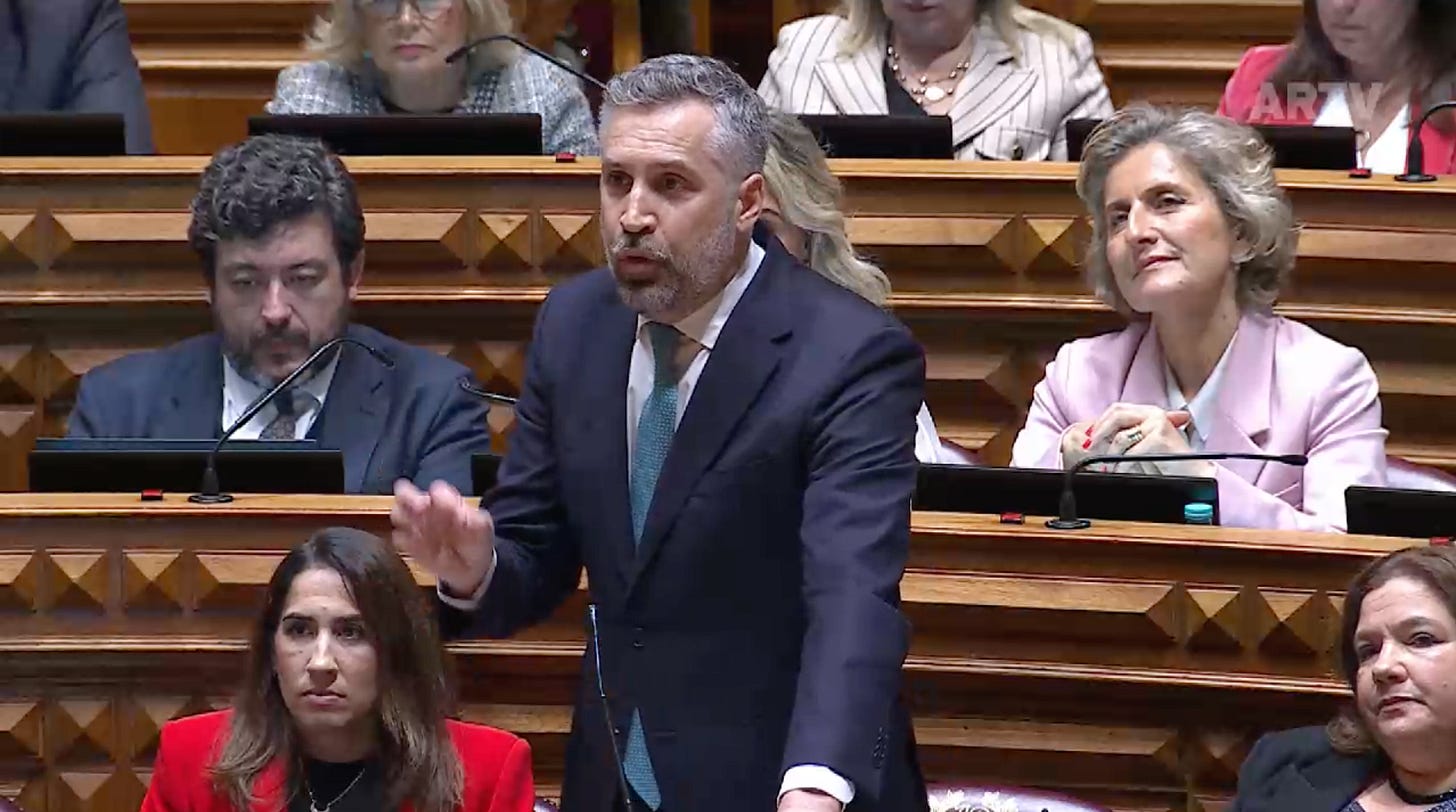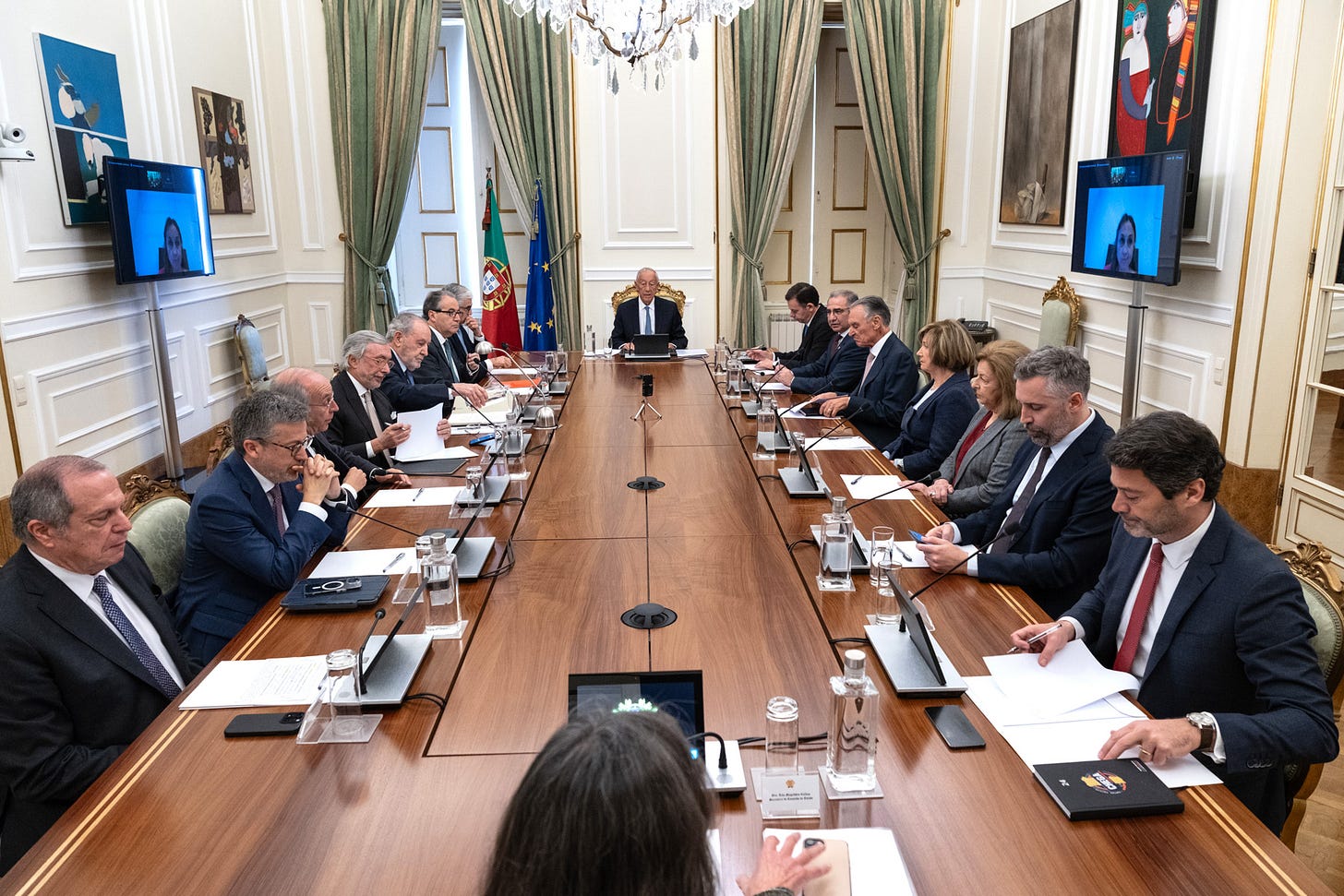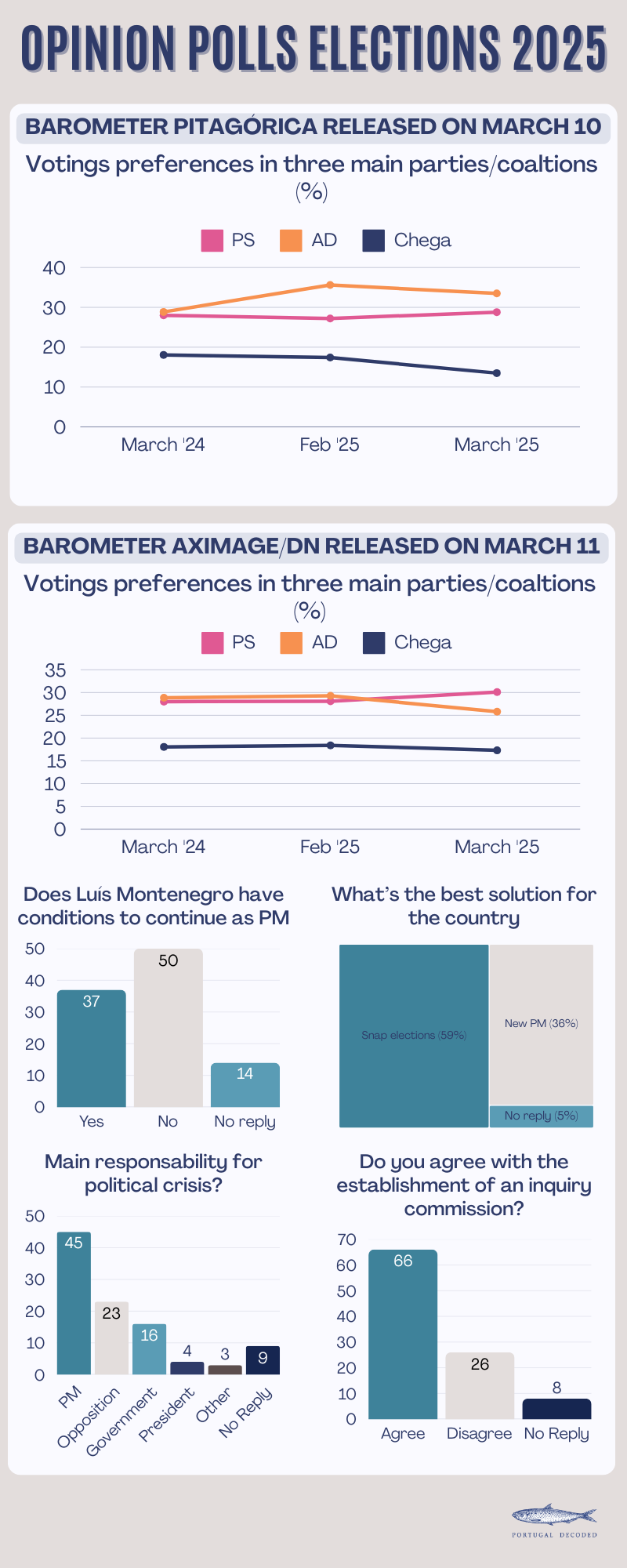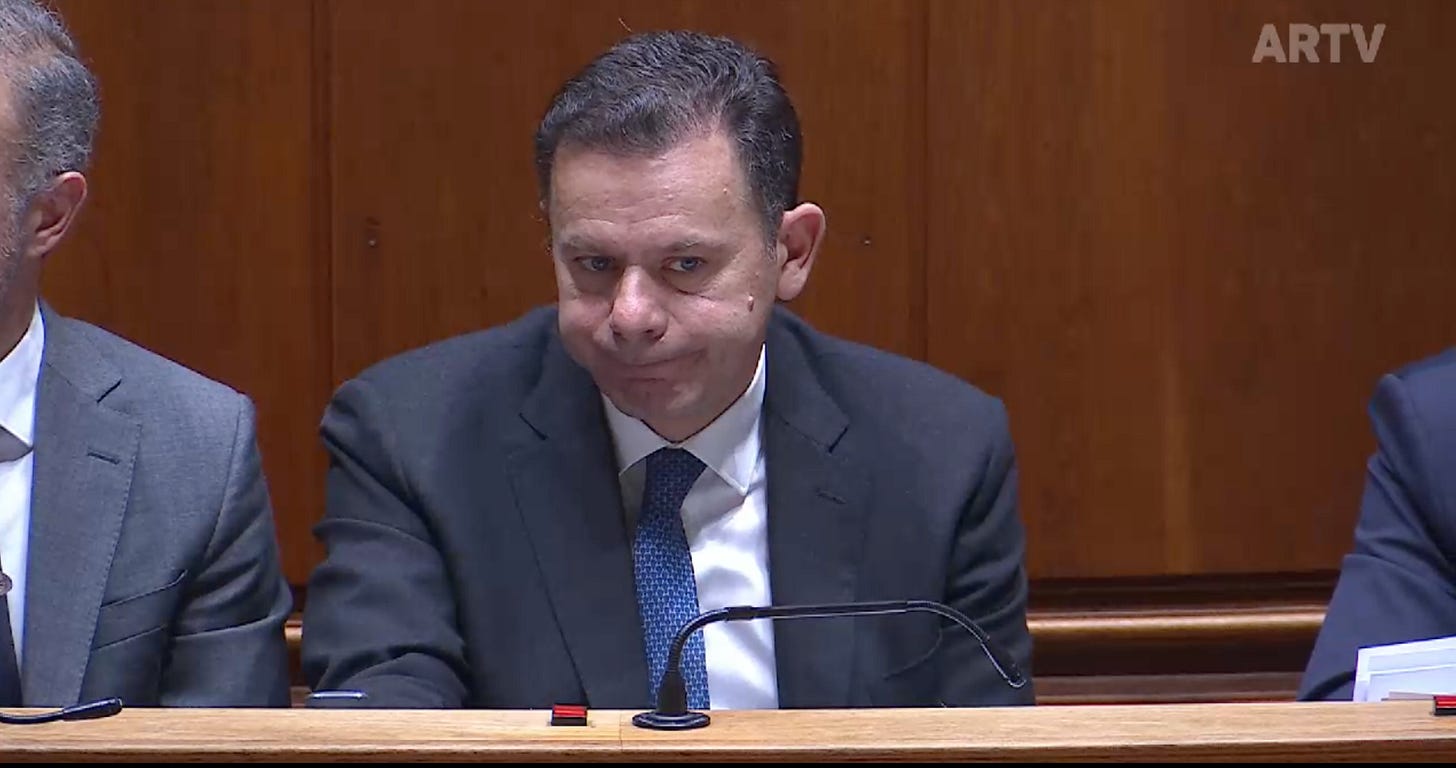Friday Briefing: Portugal's electoral rollercoaster
Good morning and welcome to PORTUGAL DECODED. Last night, President Marcelo announced a snap general election for May 18, the third in three years. Yet, the political crisis is unlikely to end there.
TALK OF THE TOWN

Hey there! If you enjoy reading PORTUGAL DECODED, please consider donating to keep it free and independent – your generosity means everything!
POLITICS
Presidential frontrunner and former Portuguese Navy Chief, Admiral Henrique Gouveia e Melo, has postponed announcing his 2026 bid, planning to do so only after the legislative elections in May (More).
Arguing that “the world has changed,” Portugal’s Defense Minister Nuno Melo rejected purchasing American F-35 fighter jets to replace the country’s aging F-16 fleet, choosing to explore European alternatives instead (More).
SOCIETY
The government unveiled a €5 billion national water management strategy for the next 15 years, which includes plans to build 14 dams, desalination plants, water catchment infrastructures and, as a last resort, river linking projects (More).
This March is shaping up to be one of the wettest on record for mainland Portugal, with relentless rain and the potential for two depressions to hit the country next week (More).
ECONOMICS
Volkswagen’s Autoeuropa plant in Palmela has outpaced international competitors to produce the brand’s first mass-market electric vehicle, solidifying Portugal’s position at the forefront of Europe’s green automotive industry (More).
Donald Trump threatened 200% tariffs on EU wines and spirits, a move that could severely impact on Portugal’s wine industry, which exported over €102.1 million to the U.S. in 2024, its second-largest market (More).
CULTURE AND SPORTS
NAPA will represent Portugal at Eurovision 2025, in Basel, Switzerland, in May. The band from Madeira, secured their victory with their song “Deslocado” (Displaced), which explores the theme of homesickness (More).
27-year-old, middle-distance runner Salomé Afonso made history as the first Portuguese athlete to win two medals at the European Indoor Championships, claiming silver in the 1500m and bronze in the 3000m (More).
DECODER
Why did the government fall?
The simple answer is that a majority of MPs (the left-wing, plus the far-right Chega) rejected the government’s motion of confidence (for further details, see our last Friday Briefing). However, the situation was more complex. The government could withdraw the motion at any point until its vote on Tuesday. Signs of the government’s disarray were clear early on. The PM opened the debate by attempting to pressure Socialist leader Pedro Nuno Santos into allowing the motion to pass. When that failed, the PM offered to meet privately with Santos to clarify doubts about his family business (also fruitlessly). He then pivoted to negotiating the terms of the inquiry commission proposed by the Socialists in Parliament. In a last-ditch effort, just before the vote, the government offered to withdraw the motion of confidence if the Socialists agreed to limit the inquiry to 60 days (the Socialist’s proposal was for a 90-day inquiry). The offer was met with silence, and the motion was ultimately rejected.
Could the main parties have avoided this situation?
Yes. For starters, the government could have withdrawn its motion and faced the parliamentary inquiry commission. It could have also addressed the media’s and political parties’ concerns about the PM’s family business, for example, by disclosing the company’s full client list. Moreover, if the government genuinely intended to negotiate the terms of the inquiry commission, it should have done so beforehand. Instead, it appeared as though the government was staging a performance for the cameras to create the illusion of trying to avoid elections. On the other hand, the Socialists could have abstained from the vote on the motion, saving the government but allowing the inquiry commission to go ahead. Some within the party have argued that it would have been wiser to clarify the issue first and then propose a motion of no-confidence against the government if the findings warranted it.

Was the President obliged to call a snap election?
No, but yes. After the government’s official resignation, the President had two options: appoint a new PM by inviting the ruling party to propose an alternative candidate or dissolve Parliament and call new elections. However, in practice, only the latter was viable for President Marcelo. When PM António Costa resigned in 2023, President Marcelo rejected his proposal to appoint the Governor of the Bank of Portugal, Mário Centeno, as his successor. At the time, the Socialists held a stable parliamentary majority, unlike the current center-right government. Following a different strategy now would be seen as highly inconsistent. In fact, some argue that holding three elections in three years has made Marcelo a source of political instability for the country, earning him the nickname “The Great Dissolver” from critics. Supporters, however, claim that circumstances left him with no other choice.

How unusual is this electoral rollercoaster in Portugal?
Quite unusual. The government’s fall marks the worst spell of political instability since Portugal adopted a democratic system more than 50 years ago. The Parliament has not served a full term since 2019. What’s more, Portugal will face four elections in the next nine months: elections for the Madeira regional government on March 23; national general elections on May 18; local elections between September 22 and October 14; and Presidential elections probably on January 25, 2026. Even going back to the unstable 1st Republic (1910-1926), it’s not easy to find such a rapid succession of elections. The period with the highest concentration of elections was between 1919 and 1925, but here the time between going to the polls was longer: six years and six months (May 1919, July 1921, January 1922 and November 1925).
What explains this instability?
The political crisis in Portugal is particularly puzzling, as it has emerged during a period of economic growth and relative social peace. An obvious answer would be that more politicians are engaging in misconduct lately. However, it is difficult to determine whether such behavior has truly increased or if it is merely a result of heightened scrutiny of political figures. Two other factors may also offer insights into the situation. First, Portugal’s proportional representation system means that, unlike the U.S. and the U.K., where only two to three parties dominate the legislature, the Parliament here gives smaller parties a voice (it currently includes eight parties and one independent MP). However, it also makes coalition-building more complex. The rise of Chega in recent years has further fragmented the parliamentary right. Second, unlike countries such as Germany, which have a tradition of grand coalitions, Portugal’s two main center parties — the Social Democrats (PSD) and the Socialists (PS) — have largely avoided governing together. As a result, minority governments are common and can easily be toppled. However, this dynamic also ensures that a centrist alternative to the incumbent is always available, creating what could be described as “unstable stability”.
Why is the bad (political) weather set to linger?
The latest polls suggest that the political deadlock is likely to persist, with little chance of either the PSD-led coalition or the PS securing a majority. This is largely due to the continued strong performance of the far-right Chega, which neither of the two main parties is currently willing to partner with. As a result, a year from now, Portugal may find itself in a similar situation. However, three key factors could still shift the outcome. First, further revelations could damage the PM’s electoral standing in May - yesterday, the Attorney General (PGR) confirmed that he had received three anonymous complaints against the PM’s family business. The Bar Association is also looking into whether the company is illicitly offering services that only lawyers may offer. Second, voter turnout in these elections may drop markedly due to widespread frustration with politicians, leading to unpredictable results. Third, PM Montenegro could yet abandon his previous red line against forming a coalition with Chega.
TIPS OF THE WEEK
Lisbon
Gulbenkian Museum Weekend
As previously reported here, the Gulbenkian Museum will close for renovations starting next Tuesday, March 18 until July 2026. This provides the perfect excuse for a livelier-than-usual weekend. On Saturday and Sunday, entry to the museum will be free for Gulbenkian Cardholders (the foundation is encouraging free sign-ups so that tickets, up to two per person, can be collected at no cost). Cartão Gulbenkian Mais members can visit freely throughout the day. On Saturday, enjoy guided tours throughout the day, workshops, and a concert with the Gulbenkian Orchestra Soloists. Free tickets for the events must be collected from the Main Building’s ticket office – from 10:00 for morning activities and from 14:00 for afternoon activities.
Porto
Porto de Arquitetura
Porto City Council and Casa da Arquitetura are joining forces once again for the second edition of the Porto de Arquitetura (“Architectural Porto”) initiative, running from March to July 2025. The program features six architectural visits and an international conference, showcasing a diverse range of projects that highlight different scales, typologies, and approaches to urban intervention in both consolidated and developing areas. These selected works, along with two public space interventions by the municipality, aim to serve as benchmarks for future developments in their respective locations. Access to the visits is based on enrollment order, with registration details announced on social media for each event. The next visits are to Monte da Lapa by Álvaro Siza (March 15), houses in Praça de Liège and Rua do Monte da Luz by Luísa Penha + GO Porto (April 12), Dr. Mário Soares Urban Park and Renaissance Porto Lapa Hotel by Visioarq Arquitectos + DMEPU (May 10), Porto Office Park by Broadway Malyan (June 7), and M-ODU, the former Porto Slaughterhouse, by Kengo Kuma & Associates + OODA Office (June 28).
Cascais
Portuguese Gastronomy Days
This brand-new event celebrating Portugal’s rich culinary heritage will take place on March 20-21at the Cascais Cultural Centre. Organized by the Cascais City Council, the event will focus on the theme “Portuguese Sweets: Past, Present, and Future,” featuring tastings, workshops, roundtables, and talks with culinary experts and researchers. Highlights include discussions on the origins of Cascais’ famous walnuts, Jesuits pastries, Sintra’s traditional queijadas, alfenim, and Azorean sweets. The event will also explore the history of Portugal’s conventual desserts, innovation in pastry-making, and sustainability in food production. A literary tour through Cascais will offer tastings of traditional sweets and Carcavelos wine, while the Cascais Food Lab will host a special cocktail and dinner at the historic Casa de Santa Maria. Most activities are free, though some workshops and the final dinner require paid tickets. Registration and the full program are available on the municipality’s website. Avenida Rei Humberto II de Itália, Cascais. 21 481 5660.
Faro
Nadir Afonso (1920-2013) – The Irresistible Passion for Painting
This exhibition - the first by this iconic artist in the Algarve - was inaugurated on Saturday, March 8, at the Municipal Museum of Faro, to reveal a little-explored side of this Portuguese painter. In total, the exhibition features around 90 pieces, which have been divided into three spaces. The exhibition, open until June 1, features his first oil paintings, made when Nadir Afonso, born in 1920, was still a teenager, works he produced as a student, culminating in the later work that contributed to his international acclaim: the ‘Kinetic Machine’, part of the ‘Espacillimité’ series. This landmark work in Nadir Afonso’s career was presented in 1957 at the Galerie Denise René, a mentor space for the presentation of kinetic art, and in 1958 at the Salon des Réalités Nouvelles in Paris.
If you enjoy reading PORTUGAL DECODED, please consider donating to keep it free and independent – your generosity means everything!









It's depressing, but not surprising, to see the same political malaise now playing out here in Portugal, as it's been doing increasingly in many other western democracies for two decades.
The UK, several EU countries, and most infamously of course the USA which is now at the precipice of both an authoritarian coup and the end-stage of crony capitalism lurching into privatised kleptocracy powered by AI and a figurehead King (happy to provide many links to support this statement, which should not come as a surprise to anyone keeping their eye on US politics); and even in my own home country of Australia the two-party duopoly has been clambering for, even bribing (via electoral favouritism for government funding), an ever-slimming wedge of marginal/swing voters to cling delicately to power, resulting in a flourishing of single-issue House MPs & particularly Senators as far back as 2010's "hung parliament", and most recently (2022) a slew of "teal independents", former right-wing (blue) party acolytes but at least have a conscience when it comes to the need for action on global warming (ridiculously considered a left/red issue; this is how stupid voters can be, to think an issue like that has any political underpinning), when mixed become teal lol. (Yes, unlike the USA, red still means communist/far-left in Australia)
Simultaneously, graft and corruption have gone up, and I assure you it's not only because of heightened scrutiny; that "revolving door between government and private enterprise" has been a deliberate breeding ground for corruption for many decades; it's just become such an accepted part of the political landscape that hardly anyone even bothers to question it any more. Its most blatant face was Trump's inauguration where the front row weren't his most ardent loyalist Congresscritters, no, they took the back row behind him, with a trillion dollars worth of Big Money in the front row.
And more recently, we have yonger voters who appear to have a sorely lacking education of the consequences and lessons of the 20th Century and its two world wars and cold war, rightly frustrated and contemptuous of their economic marginalisation and the blatant hypocrisy they see in their leaders, but now supporting far-right parties basically as a protest vote, most of them without real any idea what they're inviting in...